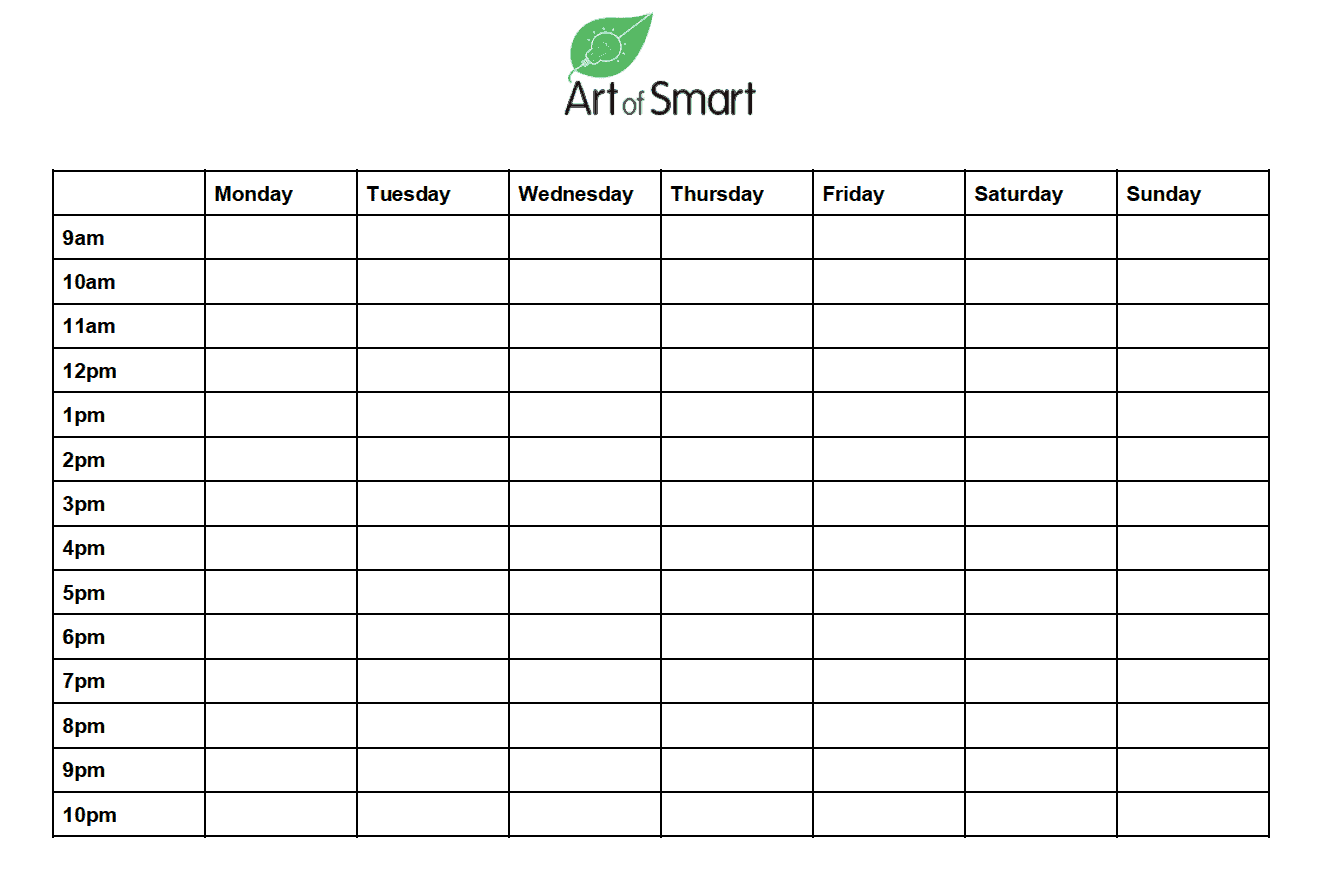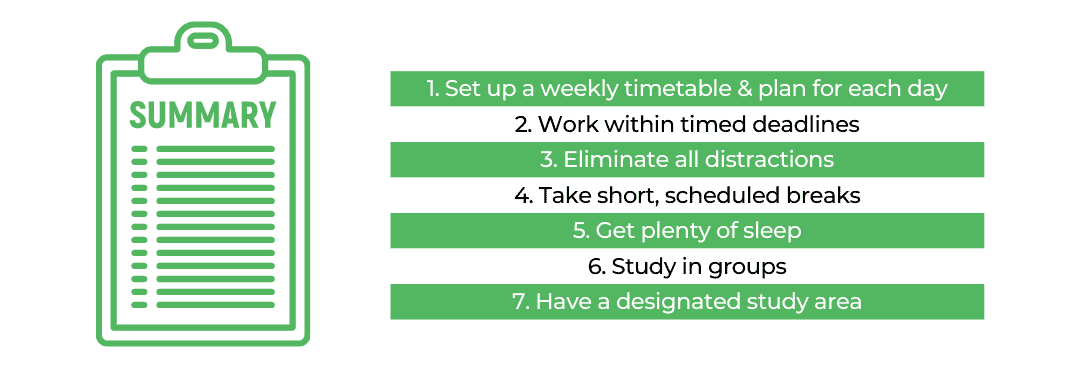Do you find yourself easily distracted or just don’t feel motivated to study when you’re meant to be? If you’re trying to figure out how to beat procrastination, we might be able to help!
Procrastination is common (even among some of the highest achievers!) and it is understandably easy to be overwhelmed by schoolwork and develop a tendency to go back to it later. But this can be extremely obstructive to efficient study.
To help you work smarter, we’ll walk you through 7 useful steps so you can beat procrastination once and for all. Let’s get started!
Step #1: Set Up a Weekly Timetable
Step #2: Work with Timed Deadlines
Step #3: Take Short Scheduled Breaks
Step #4: Eliminate All Distractions When Studying
Step #5: Get Plenty of Rest
Step #6: Study in Groups
Step #7: Have a Designated Study Area
Step #1: Set up a weekly timetable and have a clear study plan for each day
Establishing a weekly timetable can be very helpful, especially to reduce stress and have a clear plan going into each day without having to scramble and decide what to do with your time.
To download your own copy of our weekly planner, head here!
The above example is an ideal study timetable. You should aim to fill it out with your subjects, which not only tells you what you’re going to be studying but also how long you spend time on that particular subject. You can even colour-code your subjects and fill out the timetable that way if that’s convenient.
For example, have the colour red for Maths. Filling out the 3:30 and 4:00 boxes with red on the timetable means that you’ve designated half an hour of study for Maths. Alternatively, you can simply write down the name of the subject in the appropriate time-slots if that’s easier.
This’ll go a long way to avoiding procrastination as you know exactly what to do with your time, and can study with a renewed sense of focus.
A recommended tip is to print out your filled timetable and put it up at a place you can easily access as you study.
Step #2: Work with timed deadlines
This tip closely relates to the one above. Essentially what we mean by this is that you should aim to be completing a certain amount of work within a specific time frame.
For example, you come home from school and say to yourself, “In the 2 hours that I’m going to be studying Chemistry today, I want to finish writing my notes on the first 4 dot points in the syllabus”.
Another example could be, “In the hour and a half I’ve designated for Maths on Friday afternoon, I want to finish exercise 5.3 and 5.4”.
Doing this will give you a clear goal to accomplish at the end of your study time and will help you beat procrastination as you’re striving to finish something, instead of going about your study leisurely with no plan.
Step #3: Take short scheduled breaks
Students are not built to study with complete concentration for hours on end. Our bodies, and more importantly our minds, need breaks on a regular basis.
Make sure you schedule your breaks and strive to abide by them.
Frequency of breaks is also important, and an ideal situation is one where you get a 10 minute break for every hour of study. Taking breaks will help you refresh your mind and approach the next phase of your study with enthusiasm, rather than feeling drained and burnt out.
Step #4: Eliminate all distractions when studying
This one is critical!
Students are notorious for overestimating their multitasking skills, but the reality is that studying with the TV going, phone in hand and music pumping is probably not going to help you study efficiently and will lead to a lot of wasted time.
Distractions are undoubtedly the major cause of procrastination and eliminating them is not only easy, but will enable you to get a lot more work done in the study time that you have.
Website blockers are very handy resources which can greatly help you. You can choose to block particularly distracting websites such as Facebook or YouTube and this’ll benefit you big time! Two good examples are “SelfControl” and “Cold Turkey“.
Listening to music using earphones is different to having music blasting from speakers. Many successful students have stated that listening to music using earphones is part of their study routine and has actually helped them relax and get them in the mood to study efficiently.
Noisli is an app which provides soothing background noises such as the sound of waves and light rain. The noises produced are all incredibly relaxing and can help you concentrate during study.
Step #5: Get plenty of rest and stay well-fed and hydrated
Getting sufficient sleep is critical to effective study. From personal experience, pulling all-nighters may enable you to get extra work done, but will seriously jeopardise how well you study in the coming days and weeks.
Feeling tired while studying is certainly not a good feeling, and you’ll actually end up spending time thinking about how tired you are rather than thinking about your study. Fatigue from a lack of sleep has a massive impact on your physical as well as psychological well-being and will lead to unnecessary procrastination.
Similarly, ensure that you’re hydrated and working on a full stomach while studying. Always keep a water bottle with you and have a snack nearby that you can enjoy (preferably something healthy such as fruits or cashews).
Hunger and dehydration cause fatigue and will make it very difficult for you to concentrate and focus on your work.
Learn about how to maintain a healthy sleep routine so you can study effectively for the HSC here!
Step #6: Study in groups
Studying as part of a group session is one of the most effective ways to study. Collaborating with friends enables you to share opinions and hear input from others on certain topics.
As a result, this helps you to understand the content better and broadens your thinking on the topic. Clarifying doubts and strengthening weak spots in knowledge is also easier in a group setting, as you’re likely much more comfortable speaking up or asking questions to a bunch of your friends rather than to a teacher in a classroom.
Step #7: Have a designated study area
A final, and often overlooked, aspect of minimising procrastination is to have a designated study area.
Ideally, this area is a quiet place with plenty of space and ventilation such as a library. But if you plan to study at home, ensure you study in a place that’s similar and doesn’t give you the opportunity to get distracted.
For example, studying on your bed or near the TV is probably not the best idea and the likelihood of you procrastinating is high.
So what does all of this mean?
All in all, procrastination is certainly something that is very obstructive to efficient study and must be minimised as much as possible. However, following the above tips will definitely help you beat procrastination and make better use of time whilst studying!
For more great information on how to beat procrastination, you should head here!
Are you looking for some extra help to beat procrastination during the HSC?
We have an incredible team of HSC tutors and mentors!
We can help you master your HSC subject and ace your upcoming HSC assessments with personalised lessons conducted one-on-one in your home or at our state of the art campus in Hornsby or the Hills!
We’ve supported over 8,000 students over the last 11 years, and on average our students score mark improvements of over 20%!
To find out more and get started with an inspirational HSC tutor and mentor, get in touch today or give us a ring on 1300 267 888!
Aditya Krishnaswamy sometimes found writing in the HSC tiresome, but is very fond of it nonetheless. Completing the HSC in 2015, he found that his experiences studying HSC Advanced Maths and English, Physics, Chemistry and Ancient History were begging to be shared with keen school-goers with the hunger for success. About to study Advanced Engineering at the University of Sydney, Adi hopes his time tutoring in two organisations as well as his time studying in 3 different countries across 2 continents in his 19 years of life can help you get through the pressurised odyssey that is the HSC. A lifelong follower of numerous sports (namely cricket, American football and rugby league), he might even be able to educate the sporty side of you!





